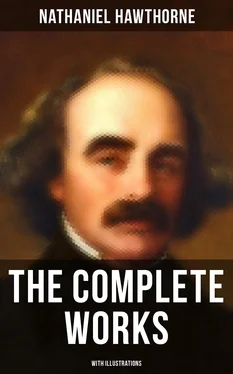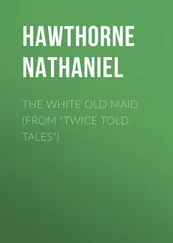The scholar’s attention was now aroused by the hoof-tramps at his side; and, starting, he fixed his eyes on Ellen, whose young and lovely countenance was full of the interest he had excited. A deep blush immediately suffused his cheek, proving how well the glow of health would have become it. There was nothing awkward, however, in his manner; and, soon recovering his self-possession, he bowed to her, and would have rode on.
“Your ride is unusually long to-day, Fanshawe,” observed Edward Walcott.
“When may we look for your return?”
The young man again blushed, but answered, with a smile that had a beautiful effect upon his countenance, “I was not, at the moment, aware in which direction my horse’s head was turned. I have to thank you for arresting me in a journey which was likely to prove much longer than I intended.”
The party had now turned their horses, and were about to resume their ride in a homeward direction; but Edward perceived that Fanshawe, having lost the excitement of intense thought, now looked weary and dispirited.
“Here is a cottage close at hand,” he observed. “We have ridden far, and stand in need of refreshment. Ellen, shall we alight?”
She saw the benevolent motive of his proposal, and did not hesitate to comply with it. But, as they paused at the cottage door, she could not but observe that its exterior promised few of the comforts which they required. Time and neglect seemed to have conspired for its ruin; and, but for a thin curl of smoke from its clay chimney, they could not have believed it to be inhabited. A considerable tract of land in the vicinity of the cottage had evidently been, at some former period, under cultivation, but was now overrun by bushes and dwarf pines, among which many huge gray rocks, ineradicable by human art, endeavored to conceal themselves. About half an acre of ground was occupied by the young blades of Indian-corn, at which a half-starved cow gazed wistfully over the mouldering log-fence. These were the only agricultural tokens. Edward Walcott, nevertheless, drew the latch of the cottage door, after knocking loudly but in vain.
The apartment which was thus opened to their view was quite as wretched as its exterior had given them reason to anticipate. Poverty was there, with all its necessary and unnecessary concomitants. The intruders would have retired had not the hope of affording relief detained them.
The occupants of the small and squalid apartment were two women, both of them elderly, and, from the resemblance of their features, appearing to be sisters. The expression of their countenances, however, was very different. One, evidently the younger, was seated on the farther side of the large hearth, opposite to the door at which the party stood. She had the sallow look of long and wasting illness; and there was an unsteadiness of expression about her eyes, that immediately struck the observer. Yet her face was mild and gentle, therein contrasting widely with that of her companion.
The other woman was bending over a small fire of decayed branches, the flame of which was very disproportionate to the smoke, scarcely producing heat sufficient for the preparation of a scanty portion of food. Her profile only was visible to the strangers, though, from a slight motion of her eye, they perceived that she was aware of their presence. Her features were pinched and spare, and wore a look of sullen discontent, for which the evident wretchedness of her situation afforded a sufficient reason. This female, notwithstanding her years, and the habitual fretfulness (that is more wearing than time), was apparently healthy and robust, with a dry, leathery complexion. A short space elapsed before she thought proper to turn her face towards her visitors; and she then regarded them with a lowering eye, without speaking, or rising from her chair.
“We entered,” Edward Walcott began to say, “in the hope” — But he paused, on perceiving that the sick woman had risen from her seat, and with slow and tottering footsteps was drawing near to him. She took his hand in both her own; and, though he shuddered at the touch of age and disease, he did not attempt to withdraw it. She then perused all his features, with an expression, at first of eager and hopeful anxiety, which faded by degrees into disappointment. Then, turning from him, she gazed into Fanshawe’s countenance with the like eagerness, but with the same result. Lastly, tottering back to her chair, she hid her face and wept bitterly. The strangers, though they knew not the cause of her grief, were deeply affected; and Ellen approached the mourner with words of comfort, which, more from their tone than their meaning, produced a transient effect.
“Do you bring news of him?” she inquired, raising her head. “Will he return to me? Shall I see him before I die?” Ellen knew not what to answer; and, ere she could attempt it, the other female prevented her.
“Sister Butler is wandering in her mind,” she said, “and speaks of one she will never behold again. The sight of strangers disturbs her, and you see we have nothing here to offer you.”
The manner of the woman was ungracious; but her words were true. They saw that their presence could do nothing towards the alleviation of the misery they witnessed; and they felt that mere curiosity would not authorize a longer intrusion. So soon, therefore, as they had relieved, according to their power, the poverty that seemed to be the least evil of this cottage, they emerged into the open air.
The breath of heaven felt sweet to them, and removed a part of the weight from their young hearts, which were saddened by the sight of so much wretchedness. Perceiving a pure and bright little fountain at a short distance from the cottage, they approached it, and, using the bark of a birch-tree as a cup, partook of its cool waters. They then pursued their homeward ride with such diligence, that, just as the sun was setting, they came in sight of the humble wooden edifice which was dignified with the name of Harley College. A golden ray rested upon the spire of the little chapel, the bell of which sent its tinkling murmur down the valley to summon the wanderers to evening prayers.
Fanshawe returned to his chamber that night, and lighted his lamp as he had been wont to do. The books were around him which had hitherto been to him like those fabled volumes of Magic, from which the reader could not turn away his eye till death were the consequence of his studies. But there were unaccustomed thoughts in his bosom now; and to these, leaning his head on one of the unopened volumes, he resigned himself.
He called up in review the years, that, even at his early age, he had spent in solitary study, in conversation with the dead, while he had scorned to mingle with the living world, or to be actuated by any of its motives. He asked himself to what purpose was all this destructive labor, and where was the happiness of superior knowledge. He had climbed but a few steps of a ladder that reached to infinity: he had thrown away his life in discovering, that, after a thousand such lives, he should still know comparatively nothing. He even looked forward with dread — though once the thought had been dear to him — to the eternity of improvement that lay before him. It seemed now a weary way, without a resting-place and without a termination; and at that moment he would have preferred the dreamless sleep of the brutes that perish to man’s proudest attribute, — of immortality.
Fanshawe had hitherto deemed himself unconnected with the world, Unconcerned in its feelings, and uninfluenced by it in any of his pursuits. In this respect he probably deceived himself. If his inmost heart could have been laid open, there would have been discovered that dream of undying fame, which, dream as it is, is more powerful than a thousand realities. But, at any rate, he had seemed, to others and to himself, a solitary being, upon whom the hopes and fears of ordinary men were ineffectual.
Читать дальше












